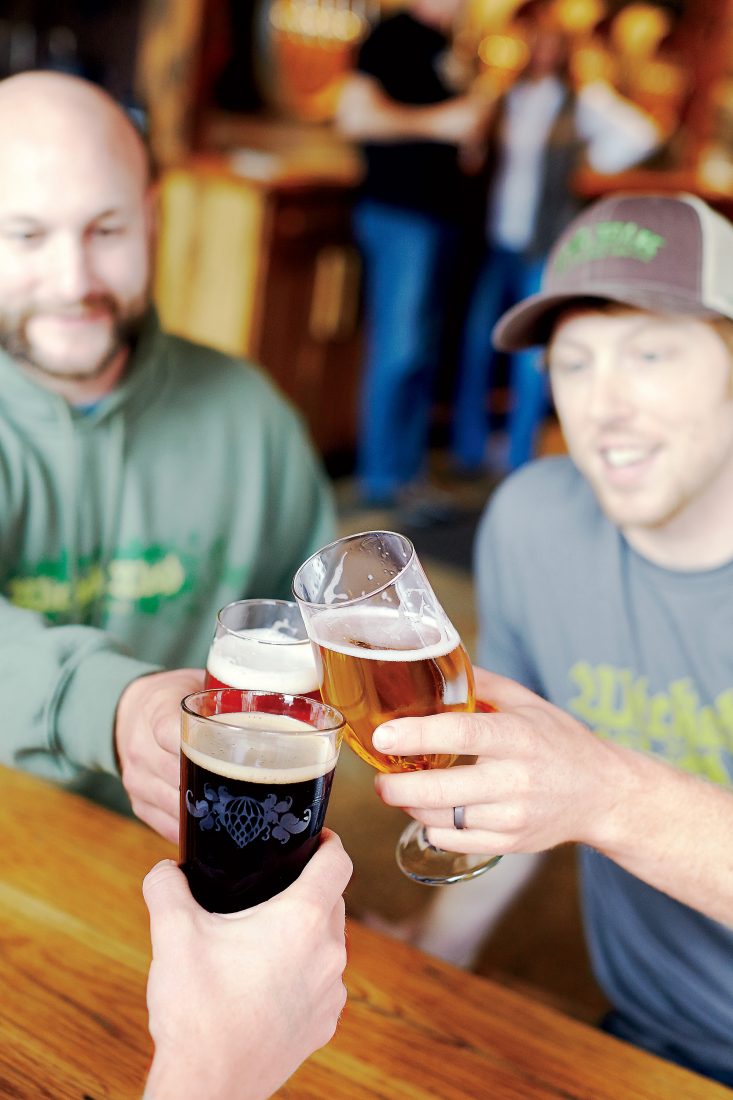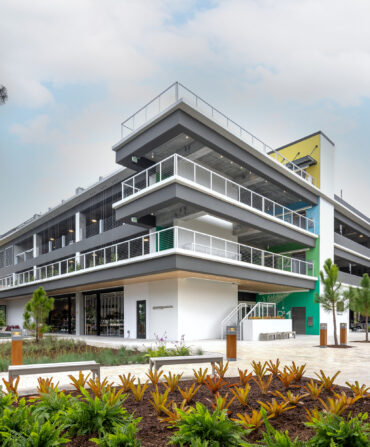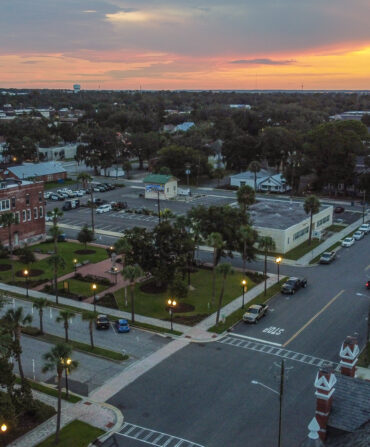The question, naturally, arose over pints: a thick-as-molasses Dark Age Bourbon Stout for me and an Infidel Porter for my buddy Pat.
“Wow, almost a year without beer. How you gonna survive?” he asked. I wasn’t sure.
Pat asked the question because I had just told him Uncle Sam would soon be sending me in uniform on an expenses-paid trip from my comfortable home in the mountains of North Carolina to a dusty corner of the planet where alcohol consumption is forbidden by the locals. Infidel Porter, indeed.
“You know what we have to do before you leave, then?” Pat asked. “A beer hike.” I took a sip from my glass and savored the stout, aged in bourbon barrels for six months and packing 10.5 percent alcohol. Almost a year without beer. A flash of white-hot panic shot through me. Out of Christian charity, I agreed.
We Ashevillians tend to be an obsessive bunch—about our exercise, our bluegrass music, and especially our beer. To say that downtown’s narrow streets are awash in hops and barley is only a mild exaggeration. There are twice as many brewpubs per capita within Asheville’s city limits as in such beer-manic cities as Portland, Oregon, and Denver, Colorado, and that number is growing rapidly.
But while Asheville has long been a regional beer hot spot, the city is making the jump to national beer hub. Home to an ever-expanding community of young and talented beer makers, who appreciate the area’s clean, abundant water and laid-back Blue Ridge living, Asheville is now attracting established Western brands hoping to tap into the scene, too. Oskar Blues, maker of Dale’s Pale Ale, opened a brewery in nearby Brevard in December. Sierra Nevada Brewing Co. will complete a facility and tasting room just outside of town this summer. And New Belgium Brewing, which produces Fat Tire Ale, is reclaiming an industrial site in Asheville’s up-and-coming River Arts District to open a beer-making campus in early 2015. Churning out IPAs instead of IPOs, Asheville has become the Silicon Valley of craft brews. Even for a beer-crazed local it’s hard to keep track of the evolving scene.
On the day of our Great Asheville Beer Hike, we begin at the beginning—the venerable Barley’s Taproom and Pizzeria. The birthplace of Asheville’s renaissance as the South’s craft beer center, Barley’s opened its doors nearly twenty years ago, when the city’s commercial downtown was a dingy, desolate place.
Inside Barley’s historic 1920s home, a former appliance store, we order a sampler of six local brews, poured from the restaurant’s forty-three taps featuring beers from the Carolinas. My favorite of the bunch is the light, fruity Pisgah Pale Ale. Pat prefers the thick, chocolaty Green Man Porter. As we drink, I can’t help but notice the red cruiser bicycle suspended from the ornate twenty-foot-high ceiling near our perches at the bar, looking as if it might fall on top of us. Printed in gold on the bike’s frame are the words “Fat Tire Ale.” The new, invading Western breweries have been lifting their legs on fire hydrants all over town like this.

Photo: Stacey Van Berkel
Bar service at Barley’s.
Still, Asheville seems less likely to be ground zero for a craft brew war than the site of a hops and barley hugfest. In town, the Brews Cruise bus tour books solid nearly every weekend. Tickets to the massive annual Brewgrass Festival in September sell out faster than an Avett Brothers concert. The words “brewer wanted” make for a common listing on Craigslist, and people flock to the gourmet beer shop Bruisin’ Ales, which stocks more than a thousand varieties.
This energetic peace, love, and beer vibe stands in sharp contrast to Asheville’s lean years. Saddled by Depression-era debts well into the 1970s, the municipal government was left with little money for improvements—a downward flush that didn’t stop swirling until the 1990s. During that time, buildings descended into disrepair, and retail shops relocated to cheaper spots on the city’s outskirts or closed altogether. What kept the city afloat were the visitors who still came to see Asheville’s Triple Crown of attractions: Biltmore Estate, the Blue Ridge Parkway, and nearby Great Smoky Mountains National Park. Out-of-towners are still so important to the local economy that the minor-league baseball team is named the Tourists.
When Barley’s opened in its prime spot on Biltmore Avenue in 1994, it offered pub grub, billiards, darts, beer, and a reason to stay downtown past sunset. Just as important, the restaurant rented its basement to Oscar Wong, a Jamaica-born, Notre Dame–schooled engineer who used the space to brew his own beer. Wong’s concoctions quickly gained a following, and to meet the demand, he started Highland Brewing Company, the first official craft brewer in Asheville. Highland—still the favorite local brand—now brews fifty thousand barrels annually from its facility in a former movie studio on the edge of town. But even Wong, the godfather of beer in Western North Carolina, couldn’t have predicted the city’s craft beer boom. “A more quiet, European small town brewery scene was the expectation,” he says.
As Highland was building a fan base in Barley’s basement, other restaurants and watering holes began to spring up nearby. Aging baby boomers, painfully fit outdoorsy entrepreneurs, and telecommuters from Charlotte, Raleigh, and Atlanta discovered Asheville and began snatching up and restoring its historic Vic-torian and arts and crafts homes. While the downtown maintained its gritty feel, it came alive, and today enjoys an economic boom—fueled in large part by beer.
Case in point is our second stop, Asheville’s newest brewpub, Wicked Weed Brewing, about a three-minute walk from Barley’s down Biltmore Avenue. On weekends, sounds from the packed dining room and long bar made of ancient planks of black gum ricochet off the wooden beams and exposed brick, but this early on a Wednesday, we find the place still relatively quiet. Though the building was originally built as an auto repair shop, there’s a whiff of exclusivity that mixes with the scent of hops and barley. A bison burger with haystack shallots and blue cheese coleslaw, washed down with a thyme-and-smoked-malt porter, isn’t exactly workingman’s fare.

Photo: Stacey Van Berkel
Taps at Wicked Weed.
That blend was exactly the intent of brothers Walt and Luke Dickinson, along with their partner Ryan Guthy, when they conceived of the place. The group poached Jason Saunders, the sous-chef from trendy Table Restaurant in town; brewer Eric Leypoldt, from the award-winning Dogfish Head Brewery in Delaware; and their name from a King Henry VIII quote about the evils of hops. “We wanted to put equal attention on the food and the beer, and we focused extremely hard on both,” Guthy says. The new kids on the block, the Wicked Weed trio have received nothing but support for their efforts from other long-standing Asheville outfits. “The beer community here is amazingly tight,” says Guthy, a lifelong local. “Although we’re all competitors in a way, we support each other to the fullest.” He adds that the hand of friendship also extends to the incoming Western breweries. Perhaps not that surprising when you consider that the local business community estimates the breweries could bring as many as a million more suds-seeking tourists annually.
It’s difficult to outshine Wicked Weed, in terms of food or drink, but Lexington Avenue Brewery, our next stop several blocks north, comes close. Known by the nickname LAB, it’s a relative newcomer, having opened in early 2010, and its open-air patio may be Asheville’s most inviting spot to drink a beer on a summer evening—especially if the beer is its refreshing Belgian-style Farmhouse Ale.
The route to our fourth destination, Asheville Brewing, takes us across the heart of downtown. Because Asheville couldn’t afford expansive “urban renewal” during its lean decades, most of its historic art deco architecture survived the wrecking ball. But what the city lacks in pedestrian malls, wide streets, and—maddeningly—parking spaces, it compensates for with an abundance of well-preserved character. Faded ghost signs on the brick facades, advertising the likes of such long-since-passed companies as Carolina Coal and Ice and American Feed Milling, are still visible, a potent reminder of the past amid the city’s beer-soaked second act.

Photo: Stacey Van Berkel
A handful of hops.
The brewery’s North Asheville mother ship, known as the Brew ’n View, is housed in an old movie theater where they show three-dollar movies, serve pizza, and brew all of their beer. But we hit its smaller location in the heart of the city for one purpose: to order a pint of its new limited-edition Belgian Mullet, a malty pale ale a couple of our beer-drinking buddies insisted that we try. You come to expect these sorts of recommendations in Asheville, and the Mullet doesn’t disappoint.
Our glasses drained, the evening waning, and our walking ability diminishing, we head out for the fifteen-minute trek toward the French Broad River and our hike’s final destination. Wedge Brewing Company sits in a nineteenth-century warehouse accessed by a long, rutted dirt drive. It has built a cult following among the artists occupying adjacent warehouse spaces, cyclists who pedal along the river, and West Asheville hippies. Only beer is served, so food trucks often park in the dusty lot outside to feed hungry patrons. But I pass them by and make my way to the bar to order a pint of Golem, Wedge’s golden Belgian ale and one of its most popular brews. Pat, a dark beer snob, orders the chocolate-and-raspberry-tinged Vadim Bora Russian Imperial Stout.
Settling in over our drinks and peanuts, we discuss the big craft brew houses staking claims, as well as the three new brewpubs currently under construction in town. Then talk turns again to my upcoming overseas trip. Almost a year without beer. And though I have to admit our hike didn’t really make the prospect any easier, one lingering thought does give me at least a small measure of comfort: Upon my return, there will no doubt be even more places to enjoy a locally brewed pint.










